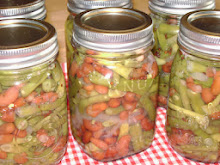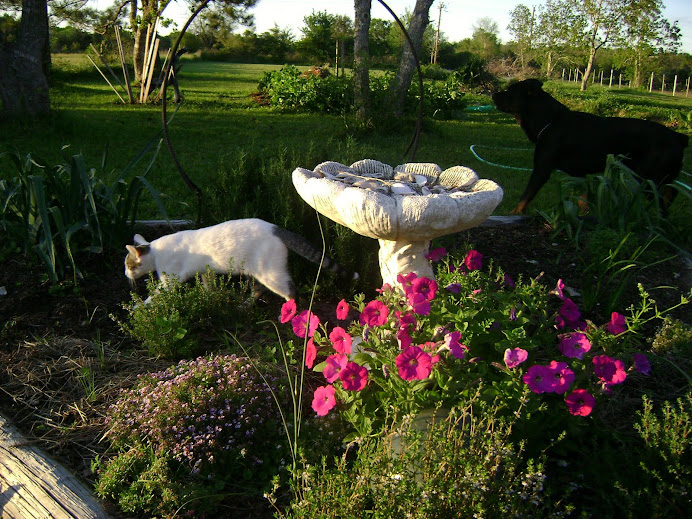Sometimes you just never know the hidden treasures that can be found in what is considered a lowly poor man's plant to be found in many southern landscapes.
This is one plant that a person can dig up and toss out and it won't die. I know, because before I discovered its value I did a whole lot of tossing.
When you really get your eyes opened to the simpler aspects of what is considered valuable for growing a healthy organic garden ecosystem, you begin to notice the obvious more often. For some of us it takes a little longer to see it. A perfect example of this is me.
The most important thing every garden needs first and foremost is healthy thriving soil. Every time I dug up the Cannas Rhizomes I noticed what a beautiful texture the soil was where they were growing.
In the Houston and surrounding areas we are prone to have a whole lot of hard clay soil and more time than not you hit clay very quickly once you dig your shovel in the ground. This is very true on our existing property. It can be very hard to work and takes an enormous amount of organic matter to make a simple garden bed.
Luckily there are many plants and trees that will tolerate a certain amount of clay soil. The problems are that with clay soil you ultimately have very poor drainage and root systems. They get bound up with no place to go because the ground it to hard..Basically one is trying to grow in muck when it's wet and stone when it is dry.
What the rhizomes of Cannas contain is very high levels of starch enzymes. What these enzymes do for the soil is create soil aeration that reduces soil compaction. In other words the soil becomes a soft loose loam that is perfect for growing most garden vegetables, herbs and flowers.
What you will find throughout our garden is clumps of Cannas growing here and there. You will see flowers blooming brightly of either yellow or orange. Other common colors for Cannas are red or white as well.
In each clump beneath the soil are starch filled enzymes amending the soil structure naturally and healthy micro-organisms teaming in the soft loam.
The Canna areas are also harboring my Anole Lizards, Toads, Garden snakes and spiders that create the perfect habitat for them. These beneficial preditors will protect my garden from harmful pests.
This simply is not the end of the story for the rich man's Cannas. By harvesting their leaves and adding them to your compost pile, the plants extracts are working to help break down your compost heap faster that most other plants will do.
This is a perfect scenario for the winter compost pile. Because the extracts are causing natural aeration it is aiding in heating the compost up. By keeping your compost nice and hot in the winter months you will be multiplying the healthy micro-organisms that keep the compost alive.
So to sum this story up, not only do I never ever toss them out, I cherish them and nurture them and promote their growth everywhere I possibly can!
It is a good time to move them around this month as they are just beginning to sprout.
Place them in new areas where future plans are to be made for new garden beds. Your soil will get a head start to health and in the end you will not need to purchase or add quite as much organic matter.
It is a good time to move them around this month as they are just beginning to sprout.
Place them in new areas where future plans are to be made for new garden beds. Your soil will get a head start to health and in the end you will not need to purchase or add quite as much organic matter.
Happy Gardening!
Pammy







































I have lots of cannas in my yard, most of them originally passalong plants. I love them!
ReplyDeleteMe too Dorothy! What colors? I really want some reds and even whites. I have seen some pinks that were fabulous looking, but I think I read that they don't have the same starch benefits.
ReplyDeleteIt's like a little bit of Florida. No ditch in the early days was complete without a canna lily patch. They are beautiful but I didn't know they were so good for a compost pile. Once again, Lover of all things green & growing, Thanks for the great info. xo
ReplyDeleteHi Kaybe! Yep, I remember that in Florida. Who would have guessed...of course we were not making compost in those days ;)
ReplyDeleteVery interesting post. I now need to add some of these to our garden.
ReplyDeleteVery easy to grow Tracey! I think you will enjoy the flowers in summer xxoo
DeleteI like cannas this just gives me more reason to put in more, the grasshoppers just eat them down to nadda usually. But I still like them. :O). I didn't know all the good gardening stuff they provide that you gave in your post :O). Good post.... Later today I am canning your salsa verde recipe!
ReplyDeleteSome years those grasshoppers can really take over things!! LOL Better them than my foodie crops I think. Let me know how you liked the salsa! I just harvested my first tomatillos for the year, so fixing to make up some too! :))
DeleteI've always had canna lilies until our severe winter a couple of years ago.
ReplyDeleteI didn't know about the compost effect but will definitely be getting more plants this year ♥